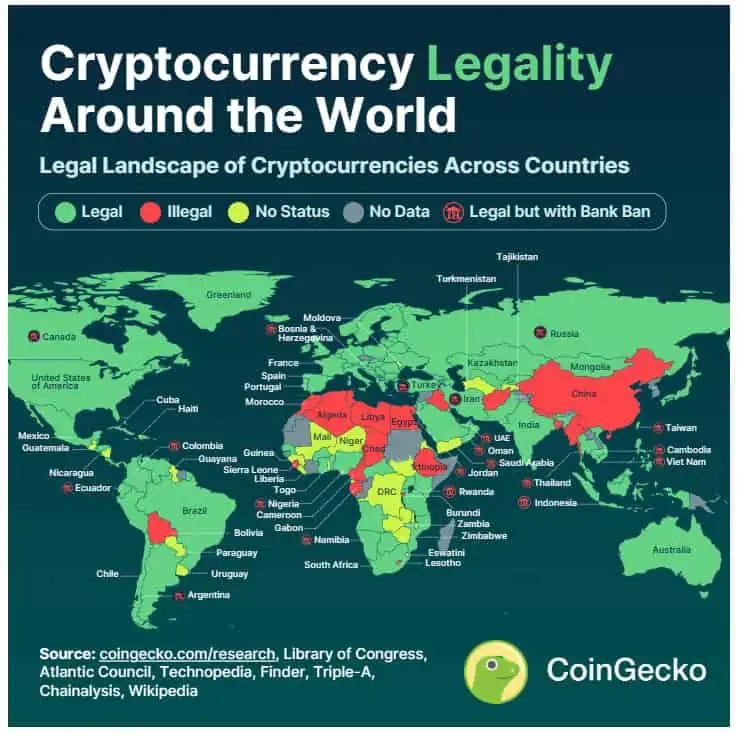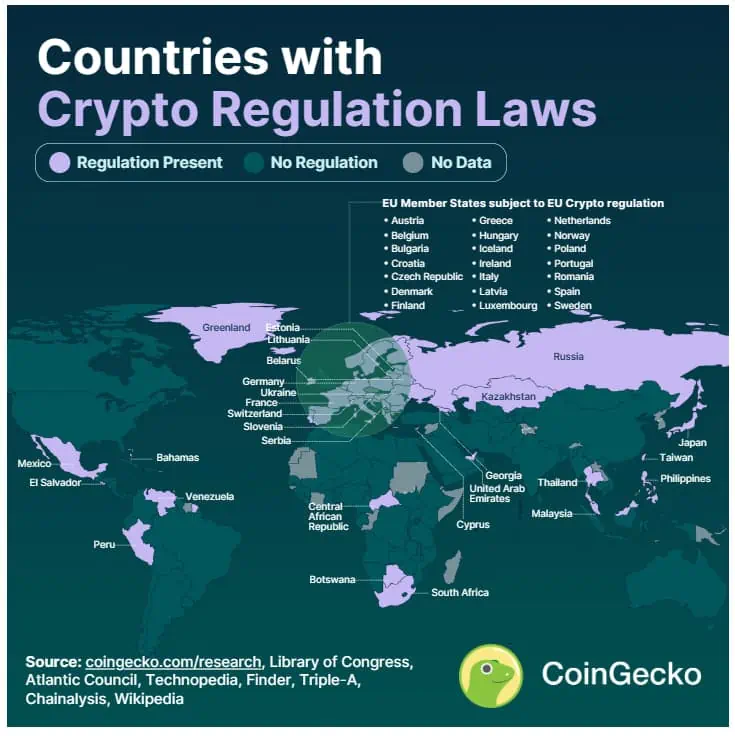
Nearly 65% of countries around the world have legalized the use of Bitcoin and cryptocurrencies, according to a recent report published by CoinGecko.
Among the countries where the use is legal the Bitcoin and cryptocurrencies are found in the United States, Mexico, Spain, Portugal, France, the United Arab Emirates, Nigeria, Colombia, Argentina and hundreds of other countries.
According to the report "Countries Where Cryptocurrency Is Legal vs Illegal", published by CoinGecko on December 11, a total of 119 countries and 4 British Overseas Territories, which represent about 65% of all countries in the world, have legalized cryptocurrencies to date.
By this, CoinGecko refers to countries and territories where their populations can use Bitcoin and other crypto assets. However, the report clarifies that many of these countries have banking restrictions, which prevent financial institutions from accessing or operating with these digital assets, as is currently the case in Argentina. Many other countries where citizens can use Bitcoin and other cryptocurrencies also lack comprehensive regulatory frameworks adapted to this new emerging asset class.
39 European countries recognize Bitcoin and cryptocurrencies
According to CoinGecko's report, in Europe, a total of 39 countries recognize the legitimacy of Bitcoin and cryptocurrencies.
These countries include Spain, France, Portugal, Germany, Russia, Romania, the Netherlands and Poland, which are members of the European Union, as well as Ukraine and the United Kingdom.

Interest in Bitcoin and cryptocurrencies in Europe has spread as the region has taken a holistic approach to the crypto industry. In fact, the platform highlighted that Europe is at the forefront of global legalization of cryptocurrencies, to the implementation of the MiC LawA, which is considered the most comprehensive and harmonized crypto regulation that exists to date.
In a report published in August, the platform had noted that most European countries were showing great interest in the market's main layer 1 cryptocurrencies, as well as those related to Artificial Intelligence and blockchain tokens. DeFi and GameFi.
America, an emerging crypto market
After Europe, America has become the second most dynamic market for the cryptocurrency industry.
According to Coingecko, more than 77% of the countries that make up this continent, including Canada, the United States, Mexico, Cuba, El Salvador, Panama, Colombia, Peru, Brazil, Chile, Argentina and 13 other countries, recognize Bitcoin and cryptocurrencies as legal within their territories.
However, as in other regions of the world, many of these countries have not yet implemented robust regulatory frameworks for cryptocurrencies, but are instead adapting their existing regulations to the dynamics of the crypto industry.

Banking restrictions and regulatory uncertainty
As mentioned above, although the use of Bitcoin and cryptocurrencies is legal in 119 countries around the world, several of these have implemented banking restrictions that prevent institutions from interacting with crypto assets within their jurisdictions. These banking restrictions include interaction with exchange platforms and cryptocurrency users, the report noted.
Likewise, the status of cryptocurrencies in countries such as Moldova, Guatemala, Guyana, Haiti, Nicaragua, Paraguay, Uruguay, among others, remains unclear to date, creating regulatory uncertainty among users.
On the other hand, in terms of countries that have declared cryptocurrencies illegal, CoinGecko highlights that Egypt, Nepal, Morocco and China, ironically, are among the countries with the highest levels of adoption of crypto assets, despite existing legal restrictions.
According to the report, Bangladesh and Egypt have more than 4 million and 3,3 million people, respectively, who have identified themselves as cryptocurrency holders. China, nearly 58 million people own cryptocurrencies, currently.
Only 2 countries have adopted Bitcoin as legal tender
To date, only El Salvador and Central African Republic have declared Bitcoin legal tender within their respective territories.
As reported by this outlet, in 2021, El Salvador's National Assembly approved a bill that legalized the use of Bitcoin as legal tender within the country, allowing citizens and businesses to freely operate with the cryptocurrency. Also, in January of this year, El Salvador gave the green light to the Digital Securities Law, which classifies Bitcoin as a digital commodity and all other cryptocurrencies as securities, becoming one of the most progressive countries for the crypto industry.
On the other hand, the Central African Republic declared Bitcoin legal tender last year, reversing its decision in March, due to the numerous challenges the country faces that hinder access and use of cryptocurrency, such as limited access to electricity, low internet penetration and high levels of poverty among the population.
Despite this setback, the Central African Republic continues Promoting the use of Bitcoin, cryptocurrencies and blockchain technology, as innovations that can improve financial inclusion and accelerate its economic development. This nation has also developed its own digital currency, called Sango Coin, and is tokenizing its natural resources on the blockchain.
Continue reading: Block: Bitcoin optimism is growing in developing countries


